#regardless of personal motivation or moral compass
Text
part of me wants to say that MV couldve really benefitted from being longer, but then i immediately remember that this is wc we are talking about and no matter what; they will find a way to deny just how dangerous a way of life following the code can be for those who don’t fit within it’s rules.
all of warriors does this and it only confuses the narrative more. im not surprised that there is so much discourse surrounding the story and it’s characters, man. and on top of that the series is targeted towards kids in elementary school so.
#god though i wish i could take back my older mv opinions though because holy hell that is embarassing#both times i read it i was like 11 and 14/15 respectively#or maybe 10 the first time i read it though i cant remember rlly#the same can be said for any arc though#theres this constant insistence on the characters to accept the code and view any cat breaking it as a moral pest#to the point where some scenes in wc imply that characters like tigerstar were only wrong cause they broke the code#or arent really that bad because they were a good warrior#staring at po3 bramble intently#this need the writers have to constantly badger the readers with the idea that code: good and anything outside of it deserves to be shunned#regardless of personal motivation or moral compass#and it hurts the story. it hurts it so bad man#this is why i love rewrites that take the clans/writers takes on the codes and use it to make their world and chars stronger#QUESTIONING THE STATUS QUO?? IN WC?? I EAT THAT UP EVERY SINGLE TIME#i feel like i derailed in the tags but STILL!! this part of worldbuilding does such a major disservice to this book and it really saddens me#wc
29 notes
·
View notes
Text
Crafting Compelling Morally Gray Characters: A Guide for Fiction Writers

In literature, there is often a clear distinction between good and evil. Heroes are portrayed as virtuous and villains as wicked. However, in recent years, there has been a rise in the popularity of morally gray characters - those who do not fit neatly into the categories of good or evil. These characters are complex, flawed, and often make decisions that challenge the reader's moral compass. In this guide, I'll help you explore the art of crafting compelling morally gray characters and how to make them stand out in your fiction writing.
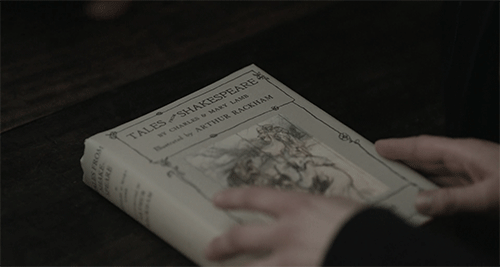
What Are Morally Gray Characters?
Morally gray characters, also known as morally ambiguous characters, are those who do not conform to traditional notions of good or evil. They may have both positive and negative traits, and their actions may be motivated by a mix of good and bad intentions. These characters often blur the lines between right and wrong, making them more relatable and intriguing to readers.
Examples of Morally Gray Characters
Some well-known examples of morally gray characters include:
Severus Snape from the Harry Potter series: Initially portrayed as a villain, Snape's true motivations and actions are revealed to be more complex and morally ambiguous.
Jaime Lannister from A Song of Ice and Fire series: Known for his arrogance and incestuous relationship with his sister, Jaime's character evolves throughout the series, showcasing his internal struggle between his duty and his personal desires.
Walter White from Breaking Bad: A high school chemistry teacher turned methamphetamine producer, Walter's character is constantly torn between his desire for power and his moral compass.
Why Are Morally Gray Characters Compelling?
Morally gray characters are compelling because they challenge the reader's perceptions of right and wrong. They are not easily categorized as heroes or villains, making them more relatable and human. These characters also add depth and complexity to a story, making it more interesting and thought-provoking.
The Power of Relatability
One of the main reasons morally gray characters are so compelling is because they are relatable. They are not perfect, and they make mistakes, just like real people. This makes them more human and allows readers to connect with them on a deeper level. When readers can see themselves in a character, it creates a stronger emotional connection to the story.
The Element of Surprise
Morally gray characters also add an element of surprise to a story. Their actions and decisions may not always align with what the reader expects, keeping them on the edge of their seat. This unpredictability makes the story more engaging and can lead to unexpected plot twists.
The Exploration of Morality
Morally gray characters also allow for a deeper exploration of morality in a story. By challenging traditional notions of good and evil, these characters force readers to question their own moral compass and consider the gray areas of morality. This can lead to thought-provoking discussions and a deeper understanding of complex moral issues.
How to Craft Morally Gray Characters
Crafting morally gray characters requires a delicate balance of positive and negative traits, as well as a deep understanding of their motivations and internal struggles. Here are some tips for creating compelling morally gray characters in your writing.
Give Them a Strong Motivation
Every character, regardless of their moral alignment, should have a strong motivation for their actions. For morally gray characters, this motivation should be complex and not easily defined as purely good or evil. It could be a desire for power, revenge, or even a sense of duty. This motivation will drive their decisions and actions throughout the story.
Show Their Flaws and Vulnerabilities
Morally gray characters are not perfect, and they should not be portrayed as such. They should have flaws and vulnerabilities that make them more relatable and human. These flaws could be physical, emotional, or moral, and they should play a role in the character's development and decisions.
Create Internal Conflict
One of the defining characteristics of morally gray characters is their internal conflict. They are torn between their good and bad tendencies, and this struggle should be evident in their thoughts and actions. This internal conflict adds depth to the character and makes them more relatable to readers.
Avoid Stereotypes
When crafting morally gray characters, it's important to avoid falling into stereotypes. These characters should not be one-dimensional or defined solely by their moral ambiguity. They should have unique personalities, backgrounds, and motivations that make them stand out as individuals.
Show Their Growth and Development
As with any well-written character, morally gray characters should experience growth and development throughout the story. They should learn from their mistakes and make decisions that challenge their moral compass. This growth and development will make them more dynamic and interesting to readers.
How to Make Morally Gray Characters Stand Out
With the rise in popularity of morally gray characters, it's important to make yours stand out in a sea of similar characters. Here are some tips for making your morally gray characters unique and memorable.
Give Them a Distinctive Voice
A character's voice is an essential part of their identity. It should be unique and reflective of their personality and motivations. For morally gray characters, their voice should reflect their internal conflict and the complexity of their moral alignment.
Create a Strong Backstory
A character's backstory can provide valuable insight into their motivations and actions. For morally gray characters, a strong backstory can help explain their moral ambiguity and add depth to their character. It can also create empathy and understanding for their decisions.
Use Foils to Highlight Their Morality
Foils are characters who contrast with the main character, highlighting their strengths and weaknesses. For morally gray characters, foils can be used to showcase their moral ambiguity and challenge their beliefs. This can add depth to the character and create interesting dynamics between them and other characters.

Morally gray characters add depth, complexity, and relatability to a story. By challenging traditional notions of good and evil, these characters force readers to question their own moral compass and consider the gray areas of morality.
#thewriteadviceforwriters#writing#creative writing#how to write#writers and poets#writing tips#on writing#writeblr#writers block#authors on tumblr#authoradvice#writer#author#writerscommunity#morally grey characters#morally gray#morally grey villain#anti hero#writers#writers on tumblr#writerslife#writer stuff#writerscreed#female writers#writersociety#writing advice#writing help#writer tips#writing resources
1K notes
·
View notes
Text
pick a photo : what do people like about you? - tarot reading ★
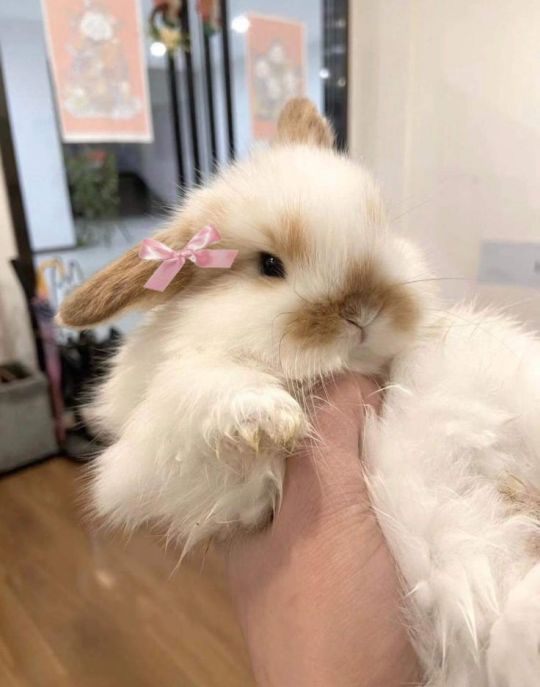

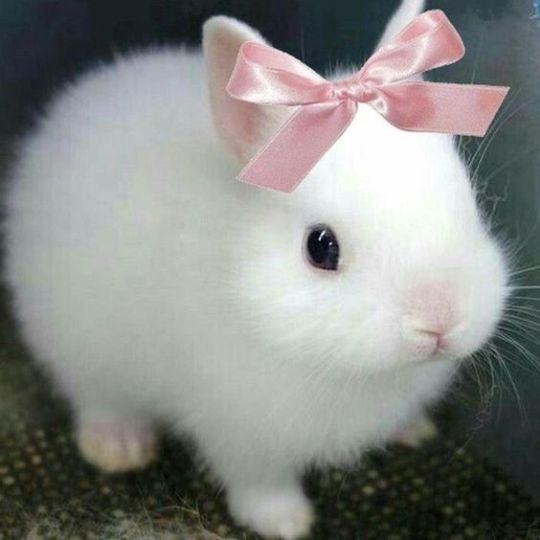
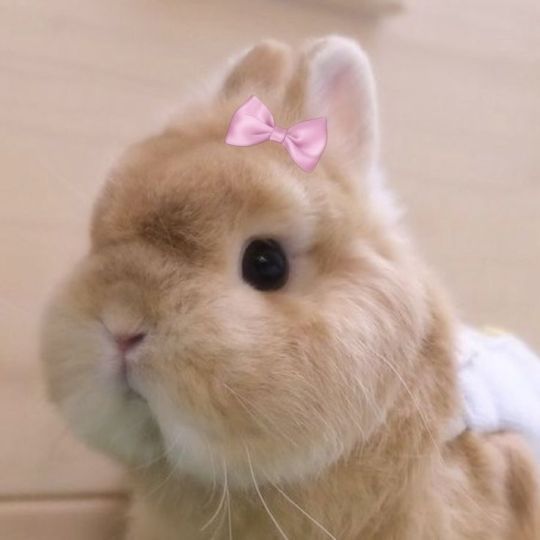
disclaimer - these are general readings, only take what resonates and leave the rest!! this reading is only meant to be for fun ♡
from top -> 1 - 2
from bottom -> 3 - 4
pile 1
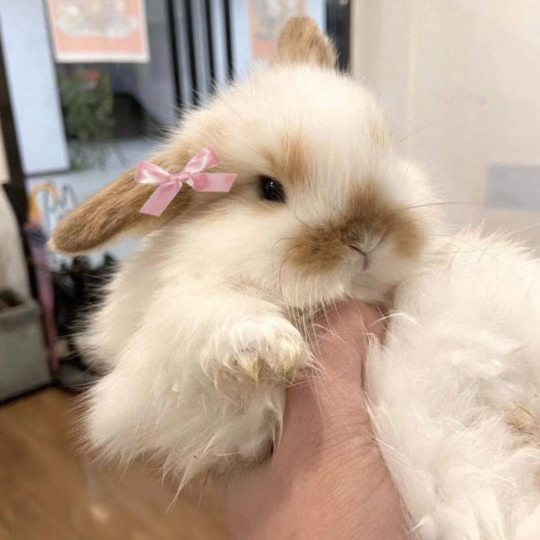
you're someone who makes people happy - your family and/or friends may find you emotionally comforting, and see you as a great friend or companion. they see you as generous, caring and down-to-earth. you may also be a homebody or someone who likes taking care of others, possibly cooking for them.
with you around, people feel a sense of zen - a comfort and a sense of peace that is hard to find in most people. you may also be a dreamer or you live in your head a lot.
overall, you are someone who is persistent - you are not the type to give up easily especially when it involves the people you care about.
pile 2
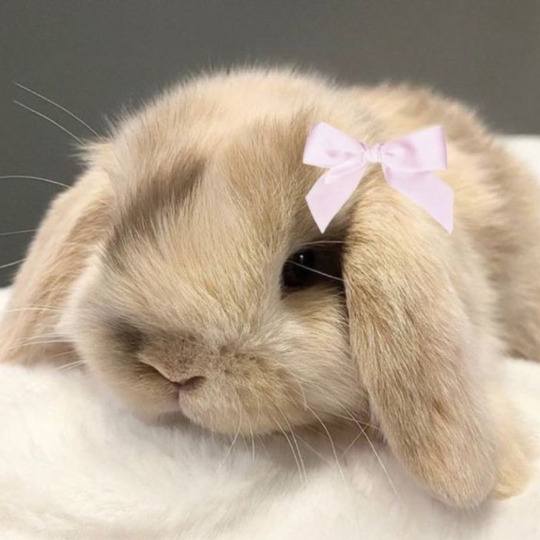
you're someone who makes decisions quickly, you're smart and witty. you have clear boundaries and aren't afraid to speak up when something or someone bothers you. you may have gone through a huge change in either your life or your character. but you're at peace with yourself and you're someone who is also comforting to be around - you give people happiness.
you also have a high moral compass and might even put yourself and possibly others to a high standard. you may also have a lot of experience or are well educated. people respect you but also enjoy your company.
pile 3

people see you as being courageous and adventurous. you bring happiness to those around you - people feel comfortable with you around, they also see you as being someone who is fortunate, maybe with the friends and family you have or with the things in which you have attained.
you're compassionate and full of warmth and kindness. you may be seen as a counsellor - maybe you listen well and provide good advice. you have a mother-like energy regardless of your gender as you're nurturing and caring.
you're confident and know your self-worth. you're also social and quite popular. you may make friends naturally - with ease.
pile 4

people see you as being a dreamer. they may see you as someone who is cute, with a child-like nature to you and they like that about you. it may be as if this is your first life and you’re experiencing everything for the first time. you probably romanticise your life and your imagination might be very vivid, they love that you approach life with excitement.
you might be able to express yourself with words well and you tend to be an honest person, they love that you enjoy conversations and they like how you use words. you should be careful as your words hold a lot of power though - just as they can motivate others and have positive influence, it can also have the power to manipulate others despite your intentions.
people also see you as someone who might have trouble juggling between relationships or a work-life balance, at least in the current moment - you might be really busy or have too much on your mind to keep your ducks in a row. but they like that you reflect on yourself and know what you need to work on. you’re constantly working on becoming a better version of you and they respect that.
#tarot#tarot reading#what people like about you#how people see you#free tarot#tarot community#pick a card#pick a pile#daily tarot#pac reading#general reading#general tarot reading
470 notes
·
View notes
Text
gonna get a bit personal here, but as an actor it hurts me to see how ppl misinterpret a character as layered and nuanced as kim
now u might be wondering: girl wtf does being an actor have to do w lieutenant kitsuragi. well, i believe it to be the case that actors are storytellers. its our job to write in our characters studies what isnt in the script, to fill in the gaps, and portray that to the best of our abilities.
while in school, my professor’s always emphasized that as an actor, 100% of the time its more interesting when your characters motivations are rooted in love, rather than resentment. and i feel like too often i see ppl understand kim’s motivations be fueled by a desire to reject, protect himself, and detach himself from a world he resents.
now; thats not to say that isn’t entirely true. after all it is what the canon tells us explicitly: that he gave up on moralism, religion, etc, because he again and again was disappointed by the reality of elysium. therefore, that must mean that from there on out kim was a lost soul, that when coming to contact with harry’s spark, it lit his ambitions once more
and yes, to an extent, thats true, but its not the whole truth. to imply otherwise is very derivative. one of the things that makes kim such a compelling character is how he never stopped loving the world around him, *before* meeting harry. and even tho he limits how much he allows himself to indulge in it, it still bleeds through the cracks. hence, when he meets harry, he pours his devotion into the case, and in turn, into harry, without even knowing the guy
would a detached character have the patience and compassion he has for harry on day one? absolutely not. the man is borderline coddling to harry despite it all. and you can hear it in the performance!
jullian champenois’ voice is characterized by its mellow, soothing quality. hes gentle about it! and the actor made that choice for a reason! kim is a gentle person! he stands his ground, he sets boundaries, keeps u in course, and is nothing of a pushover. but regardless, his temperament is calm and reassuring. thats his function as a literary device! to contrast harry’s self-hatred and self-loathing with compassion and understanding!
think about it: would a character thats insistent on being a cold wall, sit on the swing-sets with harry for the pure purpose of just being there so harry doesnt have to confront that alone? if kim only wanted to keep people at an arms length, would he insist you two to be the ones to break the news to working class woman about her husband when ur at her doorstep? he said it himself; the precinct couldve handled it fine.
if kims actions were rooted in resentment towards an unfair world, would he be an instrument of justice for the rcm in the first place? kim, who verbatim despises the cops who become cops so they can use policing as an ego outlet?
kim kitsuragi cares. he cares very deeply, and i believe that the walls around him are a result of kim attempting to keep himself *in*, rather than keep others *out*. kim keeps HIMSELF on a short leash, because he knows that otherwise he’d go all in, just like harry.
harry and kim are at the opposite ends of the same spectrum of people that are too passionate for a world that does not reward such earnestness. therefore, harry copes with addiction, and kim copes with restrictions. regardless. its all comes back to love.
#y he dicho CASO CERRADO#pls stop implying harry taught kim to care oh so help me#kim kitsuragi#disco elysium#harry du bois#harrykim#kimharry#hdb
879 notes
·
View notes
Text
WHAT IF THEY WERE. WALTER WHITE
a/n I have many wips and I am struggling to finish any of them so you get this for now. Also keep in mind I never actually finished the show and I didn't like it anyways I just think the idea is funny. Posting as a buffer for everyone who did not follow for nsfw bc I'm posting it 2nite regardless watch out
Contains TW drugs, references to violence. What it says. Would they do the shit Walter White did in Breaking Bad? The brothers + dateables. Gn mc mentioned once
LUCIFER
-Yeah.
-He would do absolutely all of it step by step, word for word
-Maybe he would not be as mean as Walter is, but he would absolutely give that “I AM. The danger, Skylar” speech
-Just to MC instead
-And Mammon is Jesse
MAMMON
-I think in his head he would like to think he would/could
-Definitely fucking can't though
-Doesn't understand the chemistry even if someone guided him, would definitely fuck up really bad
-Would be in it for the money, would brag about how he'd make an excellent drug kingpin, is lying
-The moment he needs to shoot someone he's running away
LEVIATHAN
-Not a chance bro
-The closest he would get would be filling in the role of Gale
-Even then, that's a stretch
-It's too scary :(( what if all the drug mules think he's cringe
-Yeah sure he did all those illegal things but the police probably wouldn't care so much if he was cooler
-Absolutely not suited for the meth-making lifestyle
SATAN
-Wouldn't do it if it was his life on the line. Would only do it to get back at someone else
-Ruining Lucifer’s reputation by selling illicit substances out of the HoL
-Probably the most suitable for drug manufacturing. Not anything else though
-Would be the most likely to be despised by everyone else in the distribution chain
-It's a high-stress environment and he takes out his anger on all of them
ASMODEUS
-Personal protective equipment is ugly and the meth business is a thankless one. There is no possibility for him to gain fame and attention doing that unless he also wants to go to prison
-Probably finds it kind of gross and messy too
-There are a number of illegal activities that are far better suited for a demon like him and he knows it
BEELZEBUB
-Eats the meth
-The end
BELPHEGOR
-Perhaps unsurprisingly, would likely have both the intelligence and personality to make it work
-But the meth-making process takes forever, and there are so many points where you can accidentally die, so I think he knows better
-Would accidentally fall asleep and melt his skin off his body
-Also has virtually no reason to do it in the first place; isn't hurting for cash like Mammon and doesn't really care about his reputation like Lucifer
DIAVOLO
-Would have trouble grasping the severity of drug manufacturing and dealing
-Might only get into the scheme if coaxed by the promise of friendship
-I do not put it above him to realize that it is also illegal, however
-Albeit he has had his moments of considering himself above the law, which, if anyone is, it's him, so maybe not
-Will bail the moment someone yells at him or pulls a gun on him, whatever happens first
BARBATOS
-Gus
-His moral alignment and motivations are too vague. Either his moral compass is too strong or he would be the best drug kingpin the devildom has ever seen. Maybe both at the same time
-Would get suitably angry if anyone else got involved though
-Money laundering pro. If nothing else is true I know this is canon
SIMEON
-Oh good heavens
-Deary me
-Maybe with his skills in baking he would do well, but you'd need to lie to him about what you're making
-Shocked and appalled when he finds out
-Most everyone else is nice to him though
SOLOMON
-Probably makes illicit substances for his funny evil wizard experiments
-Since it's a form of cooking though the batches always end up terrible
-Meth that makes all your bones turn to jelly and kills you in five days
-Since he is far removed from human matters of mortality and injury, he probably thinks it's funny
-Evil ass
#obey me#obey me lucifer#obey me mammon#obey me leviathan#obey me satan#obey me asmodeus#obey me beelzebub#obey me belphegor#obey me barbatos#obey me diavolo#obey me simeon#obey me solomon#tw drugs#tw violence
41 notes
·
View notes
Text
Killing is not always wrong, and the act of killing doesn't automatically make someone a bad person:
Yeahhhh, okay, so as usual, these same idiots are completely misconstruing my words and points.
Let's, for a moment, just accept the absurd premise that killing is always morally wrong, and can never, no matter the circumstances surrounding the act, be justified. Let's just accept that premise for a moment, no matter how absurd or childish or rooted in actually harmful naivety it is.
The argument being made is that Levi, because he's killed, is a bad person. That's the argument. That because he's committed a "bad act", that automatically makes him a "bad person", regardless of the reason or circumstances surrounding his so-called bad act. The argument, then, boils down to ones actions being the sum total of a person's character, and there is no room from there on for any other considerations or factors in judging that person's character. You've killed someone, so, no matter the reason, you're a bad person.
I really wish I didn't have to explain why this type of thinking is wrong, but given the amount of morons liking and reblogging this person's post, I guess I'm forced to.
Even supposing someone commits a "bad act", (again, accepting the premise that killing is always wrong) that in and of itself doesn't make the person who's killed a "bad person". A person's character shouldn't be judged on their actions alone, especially when those actions are viewed in isolation, without considering the mitigating circumstances surrounding them. What a person should be judged by is their actual character, who they are, how they regard and treat others, what they believe, what they feel, etc… Is someone who kills in self-defense automatically a bad person, even if they feel deep regret and sadness over having had to kill someone to save themselves? That's what this person is saying, and it's patently ridiculous and false.
Again, Levi killing, even if you accept the premise that all killing is wrong, doesn't make Levi a bad person. What would make Levi a bad person would be if he killed and enjoyed it (like Zeke) or if he didn't care about what happened to other people, if he felt no empathy or sympathy for anyone but himself, if he enjoyed watching others suffer, if he felt nothing at the loss of life, if he selfishly put his own well being and desires over everyone else's wants and needs. THAT would make Levi a bad person. Not the act of killing alone, but him having a lack of feeling or empathy, remorse or sadness over the act.
This person doesn't seem to get that good people can do bad things, which is one of the central themes of AoT. They don't seem to understand either that we're not saying Levi is good because he kills, or that his killing is good because he's good (why would anyone ever think that's what we're saying?). We're not saying killing is good at all, but that it can be right, depending on the circumstances surrounding the act, and we're saying Levi is good because he's a totally selfless individual who cares genuinely and deeply about others, who sacrifices his own well being, both physical and mental, to help others, no matter the consequences to himself, and that his acts of violence, whether you regard them as justifiable or not, are committed for selfless and understandable reasons, like saving his own life or the lives of others, because he cares about and wants to help people, and are never motivated by things like greed, lust, self-satisfaction, self-aggrandizement or for petty revenge. Regardless of whether you think his violence is right or wrong, justifiable or not, it's that quality of compassion, kindness, empathy and selflessness in Levi that marks him out as a good man and a hero. To deny him that is disgusting and shows a level of stupidly blunt judgmentalism that shouldn't ever be accepted in any substantive debate over this sort of thing.
Beyond that, this idea that killing is always wrong and that killing in self-defense will always and without fail lead to justifying outright murder is nothing but a childish fallacy. There's even a term for it, called the "Slippery Slope Fallacy":
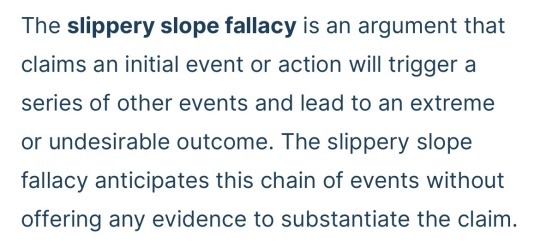
Our justice system differentiates between murder and justifiable homicide for a reason. You can't judge every act of killing the same way, or from the same principle of it always being wrong, no matter what. The only thing that sort of thinking leads to is mass persecution, punishment and oppression, both of thought and action. To view anything through that sort of black and white lens of moral correctness is to deny reality itself and the complexity of both the world we live in and of human beings themselves.
There are countless examples I could give in which killing can be and is regarded as justifiable and correct, but there's really no point in me making this post any longer than it already is. Anyone with a functioning brain and that actually applies logic to their thinking should be able to figure out what scenarios and situations and circumstances would render killing the right and correct course of action.
And that's all I'm going to say on this subject. It shouldn't even need to be explained. But, you know, tumblr and its users woeful lack of critical thinking skills strikes again.
31 notes
·
View notes
Note
I hope people don't take this as acephobic but Alastor being ace doesn't even make much sense to me? He was a serial killer in his previous life and most male serial killers were driven by misogyny and sexual sadism (moreso the latter for the gay ones). Like even his interactions with Charlie seem like he's trying to seduce her for his next kill or something. Let's not even get into the optics of making your one ace character be a mass-murdering psycho that represents the worst of cishet misogyny, it's just a weird pairing. Also his backstory kinda ruins the mistake of this random demon that was killing all the big bosses for power, and killing for power isn't exactly the motivation of most serial killers either? If they didn't have the serial killer part him being ace would work better I think, why not give that to Husk that only seems to care about booze or Cherri who's in a seemingly platonic relationship with Angel? Seems she just slapped it onto a random character based on a joke interaction. I really hope people don't take this the wrong way.
Eh, wouldn’t say Alastor was seducing Charlie, more of he was playing it safe and acting like he had no tricks up his sleeve while literally openly mocking her, but as for him being Ace, to me personally while I don’t have an issue with the concept (like as long as the show knows this dude is evil and doesn’t insinuate that ace people are bad, it’s fine in my book cause I’m all here for representation regardless if it’s a bad character or not) but my personal issue was like…it just didn’t feel like it needed to be there. Like…the only reason he’s ace is because he was described to be “obsessed with himself” and that doesn’t automatically mean you need to make a character ace. It felt like it wasn’t something Viv had planned out and only slapped that title on him at the last minute because…..why not more representation points, despite the fact that….let’s not forget the pilot itself never outright said he was ace either, which I find more suspicious.
Also I always immediately disregard the “but serial killers”- argument for Al because let’s be honest, Viv not only doesn’t do research but doesn’t think deep when creating certain characters. The only time I felt his serial killer title didn’t make sense was how he is introduced as this unapologetic evil murderer who does everything for laughs, and then suddenly has this forced moral compass about respecting those lower than him, like seriously wtf was Vivzie thinking when writing that?
Overall however, in my eyes, she wanted an edgy scary demon lord, and him being a serial killer felt more like a quick excuse to find a reason why he’s in hell, basically what I’m saying is…..Al doesn’t have that many layers to him, hence why I don’t think too much about these things, but I DO agree that someone like Husk or Cherri being ace would make more sense or just…be better, mainly Husk since he clearly isn’t looking for love and is dead inside, but we can’t have that cause Uwu Angel needs to flirt with him so—
#reply#ask#vivziepop critical#spindlehorse critical#hazbin hotel critical#Hazbin critical#hazbin hotel criticism#hazbin hotel critique#alastor critical
80 notes
·
View notes
Text
as we're talking about how tarantulas views prowl re: his behaviour towards others, this is going a little off on a tangent so i'll put it in its own post, but i was thinking the other day about the positive reinforcement prison and what it tells us about mesothulas and prowl in terms of what they were doing together.
mesothulas got told to make a perfect prison. so he created a perfect prison. the positive reinforcement prison is clearly a fucking fantastic way to ensure you reduce the likelihood of escape to near-zero. it completely disincentivizes any resistance. it keeps a threat pretty close to perfectly contained. it's clearly horribly immoral, for a start it LITERALLY brainwashes people- but prowl asked for a perfect prison and he got a perfect prison, courtesy of mesothulas.
prowl's objection to the prison is notably not like his objection to the noisemaze; it's not one of ethics. no, mesothulas mentions offhandedly that prowl felt that it was an issue because it didn't punish the prisoners enough. it rendered them completely harmless and secure, but that wasn't what prowl wanted, apparently. what's the point of punishing prisoners who are at no risk of escaping and therefore need no dissuading? well… prowl presumably just feels they 'ought' to, because they 'deserve it'. his sense of morality is one where you punish people who 'deserve it' regardless of whether it serves any actual purpose.
mesothulas has absolutely no moral compass. but the thing is, that really is no moral compass. he will do what he wants to do and it does not matter if it hurts other people doing it; but he doesn't have any active desire to hurt other people either. they're just irrelevant. he'll torture roadbuster if it gets him what he wants, but he doesn't tell himself roadbuster 'deserves it', even just in the sense of 'he's beneath me' or whatever. he just sees it as a way to get from point a to point b. hence the positive reinforcement prison: it's not that he wants to spare anyone suffering, he just wants to find the most efficient solution to the problem.
prowl has a moral compass, unlike mesothulas. he thinks that evil exists and must be defeated, he thinks harm to others is bad in the abstract, he thinks he has a righteous cause, all that. this pretty much universally results in him doing much more harm than mesothulas overall, because no moral compass is bad, but a sense of morality and therefore drive which is turned to bad ends in the name of 'justice' is often worse. mesothulas doesn't care about the war and never gave a shit about making weapons to fight it. prowl, in his desire to end the war at any cost, gets him to make a bomb and nukes a refugee city. mesothulas didn't care about that, but it never would have occurred to him to do that if prowl hadn't incentivized it. mesothulas doesn't care about 'bad guys' getting what they 'deserve', so he's happy to make a perfect prison that doesn't punish anyone if that's not a required part of making it work. prowl, who needs the 'bad guys' to be punished to satisfy his sense of morality, insists upon shelving it in favour of something less inadvertently merciful. (spark extraction doesn't seem to be torture, but it's clearly not actively pleasant.)
and mesothulas makes stuff! he doesn't do it for altruistic reasons. but he makes things; he makes a whole person, in fact, just to do the making part. he makes ostaros! and sure, his original motivation there was almost certainly pure fascination… but that doesn't change that fact that he is capable of creating something wonderful just because he wants to do so.
meanwhile, prowl tosses mesothulas in the noisemaze because his sense of moral injury gets too great… and then that sense of guilt doesn't stop him from trying incredibly fucking hard to kill ostaros, the absolute most innocent person it's possible to be. he KNOWS he shouldn't, and so he tries to get around his own inability to do so by sending impactor. it's not a. subtle difference between them.
it makes me think of that bit in OP #25, the epilogue issue post-Unicron... where prowl talks to shockwave about how he understands now that it's not what you think that matters ('our hopes'), but what you do. prowl thinks of himself as inherently more moral than mesothulas no matter what he does because he has the ability to feel the way you're 'supposed' to about things. sure, he only ever destroyed, whereas mesothulas could make things. but mesothulas is selfish, and prowl cares about other people. sure, prowl did terrible things that killed people, and mesothulas in large part only helped because prowl enabled him to. but prowl feels bad about nuking that city, and mesothulas only wouldn't have done it on his own because he doesn't care. sure, mesothulas also, you know. wouldn't have done it. but prowl thinks that an important part of being Good is following a certain set of moral rules as dictated by society, and he sees himself as achieving that where mesothulas fails, so he must be better in a moral sense. that's why he thinks getting rid of mesothulas will fix what he's done, stop him doing bad stuff. he thinks mesothulas is just fundamentally a worse person because there's something wrong with him, and prowl is fundamentally a good person because he has what mesothulas lacks, and when it turns out to be more complicated than that he has no idea how to fix it. and he cannot conceive of the idea that he made mesothulas more dangerous at least as much as the reverse is true, because he can't imagine anything being worse than not having a sense of morality.
#this is very disorganized sorry#i just think it's really interesting to look at characters as being worse because they have these traits#how they're not inherently redemptive the way they're often assumed to be#similarly: the idea love is not an inherently good thing which is always 'worth it'#meta#tarantulas#prowl#taraprowl
132 notes
·
View notes
Text
Ok, but what if
Jon is NOT gone.
I described in length here why I don't think Jon reintegrated into Sherlock's psyche at the end of Chapter One and how I think he is just gone.
However, there is an additional theory I have and I would like to talk about. So what if Jon is gone but not GONE gone?
This rambling is based on overthinking every line in these games, so keep that in mind as you continue reading. Also, I'm likely coping very hard here because I love Jon with all my heart.
First and foremost, I will treat Jon as a sentient being here. I imagine Sherlock and Jon like two flowers planted in one pot. Jon is a personification of Sherlock's love for life and himself; still, Jon is portrayed as having a consciousness. He not only has his own opinions and personality, he also has feelings. E.g. he describes the feeling of being ignored by Sherlock as a "punch in the gut ", he experiences anxiety when forced to face the nature of his existence, etc.
To explain why I don't think Jon vanished completely, I will start by explaining how I read the events of Chapter One from Jon's perspective.
Sherlock created Jon because he was lonely; he wanted to be happy and loved, so he placed his own self-love into Jon and made him his biggest fan and a neverending source of motivation to pursue the more fun parts of life. Jon provided a certain balance in Sherlock's life and also acted as his moral compass. However, Jon struggled with the nature of his existence from the very beginning. The memory at the theatre shows him being distraught by the audience's inability to see him. He refuses to keep this memory; even when he and Sherlock recall it ten years later, he never addresses it in his diary. He jokes about how excellent his performance was, but he is in denial that it ever happened the way it happened. The memories hurt Jon, who feels like a real person but never gets to live as one. The only thing in Jon's life that affirms that he exists at all is Sherlock, and it's a great source of anxiety to depend on someone so completely.
During Chapter One, we witness the impact Sherlock's memories have on Jon. He asks Sherlock twice to let it go because the memories hurt him, and they hurt him because he exists to love and protect Sherlock. Therefore, Jon's whole purpose is threatened if Sherlock refuses to be protected by him; in a way, if Sherlock chooses to remember and, therefore, be hurt, he rejects everything Jon stands for, everything he was created for.
And yes, I'm convinced Jon mostly cares for Sherlock's well-being, but he isn't entirely selfless either. There isn't a conscious being that can be entirely selfless. He is in the unique position in which every single action of another person is directly tied to him and affects him. Every time Sherlock chooses not to listen to him, his role in Sherlock's life becomes more and more unsteady, which terrifies him. They can't be close and united if they don't share the same values. I think the worst thing that could happen to Jon is to end up being irrelevant and ignored by Sherlock, but being forced to continue existing regardless.
Now, I will just post this journal entry, which Jon writes if Sherlock ends up killing someone.
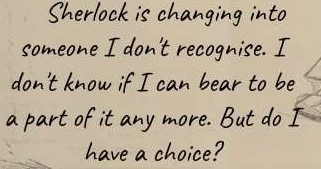
This is how this reads to me: Jon can't bear watching Sherlock become a murderer, but he is not only concerned for Sherlock; he also doesn't want to feel the pain of watching Sherlock change like this. He doesn't want Sherlock to alienate himself from him. This is what I mean when I say that Jon is not selfless. He doesn't want Sherlock to be hurt, but he doesn't want to hurt either. Another thing I see here is him posing the question if the has a choice, and at least at this point, we can conclude that the answer is no. This is an important point for this post.
Now, I will come to the end of the game. After Sherlock enters the garden and begins regaining his memories, we have yet another scene of Jon begging Sherlock to talk to him and saying he is scared.
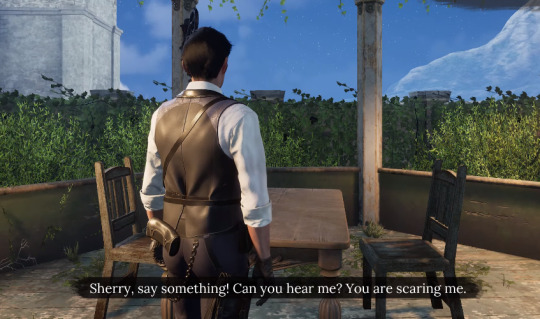
I think this shows pretty well how anxious he is about becoming irrelevant or even invisible to Sherlock. The end scene in the garden is everything Jon fears slowly coming true. And it doesn't end there. No, it culminates with Sherlock denying to acknowledge Jon as a person.
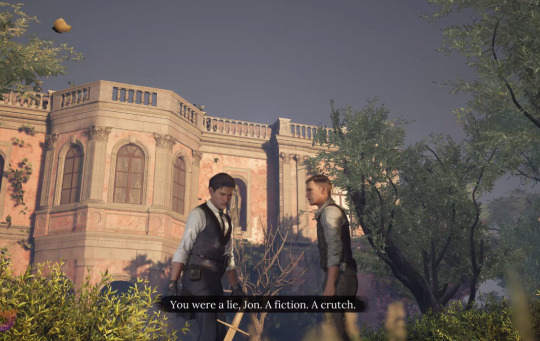

And this, in my opinion, is the moment Jon knew he wants to disappear. He barely interacts with Sherry after this, except for asking why Mycroft is there after Mycroft poses the question if "Jon is worth it". We still don't know what Mycroft means, but it's implied he thinks Jon isn't worth "it", which is kinda rubbing more salt into Jon's wound haha :'). Hell, Jon doesn't even intervene in the scene where Sherlock pulls a gun on his brother, he stays on the bench.
As I said in my previous post, I see all four endings as bitter. Even in the two endings in which you blame Otto, the last interaction between Sherlock and Jon lacks the usual warmth between them. I think it's because Jon is quite bitter himself. He is hurting a lot. He tries to reminisce about their times together and says his life hasn't been wholly in vain, but he is just done with it at this point. He is leaving, but not only for Sherlock's sake; he is leaving because he can't bear the pain of staying with Sherlock after being called a lie by him, especially because Sherlock hates lies. Jon has protected Sherlock for years, but Sherlock thinks it was wrong, and Jon's whole purpose is put into question. Sherlock has always been the only person to believe in Jon, and from Jon's perspective, he no longer does.
Don't get me wrong, I don't think he leaves out of spite. I simply think he'd rather vanish than feel obsolete.
I think this post is getting rather long, so I will just get to the point. Why do I think Jon is not GONE gone? Because he implied he has no choice than to witness what's happening to Sherlock, no matter how much it hurts him. And because Sherlock keeps addressing him during The Awakened in a way that suggests, that he still might be somewhere.
Yes, Sherlock misses Jon and he is desperate, so him talking to Jon shouldn't mean much in this regard, but still, Sherlock doesn't seem to believe that Jon is gone.
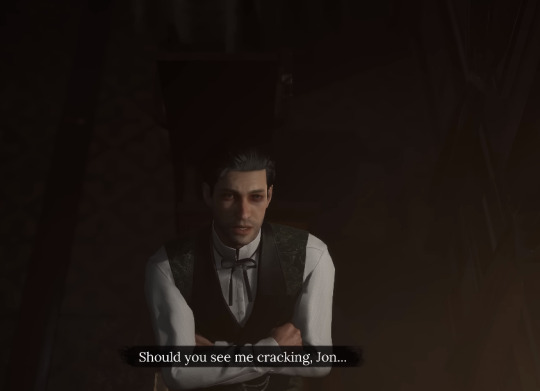
He seems to believe that Jon is still watching him from somewhere (from Heaven? Why are you looking at the ceiling, Sherry?) and is fully able to make an appearance and "intervene" if he wants to. Of course, Sherlock doesn't know everything, but honestly, I agree with him. Because why would Jon have the ability to erase himself from existence? If he could simply erase things, he would have likely erased Sherlock's memories of Violet's death. However, he has the ability to conceal things, like memories, so it's not unlikely that he can conceal himself too.
I think Jon is still somewhere deep inside Sherlock's mind. We already know he can disappear whenever something makes him uncomfortable (like Dilwyn), so I'd like to think that he disappeared in the same way during the ending too. I think he is dormant right now. And he is hurt. But he is there. I don't think Jon can die unless Sherlock dies.
#sherlock holmes chapter one#sherlock holmes the awakened#ramblings#i need to be told to shut up lmao
27 notes
·
View notes
Text
SPOILERS FOR THE RECENT GLADION & MAGEARNA EVENT !!!
some of my fav scenes from the story 👇
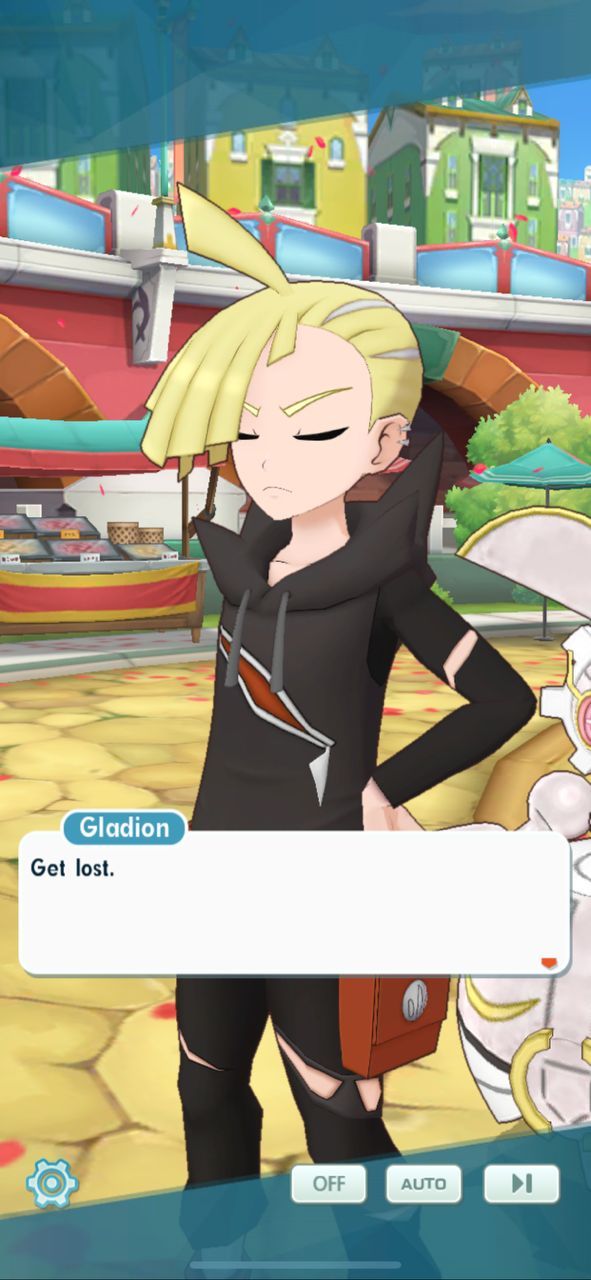
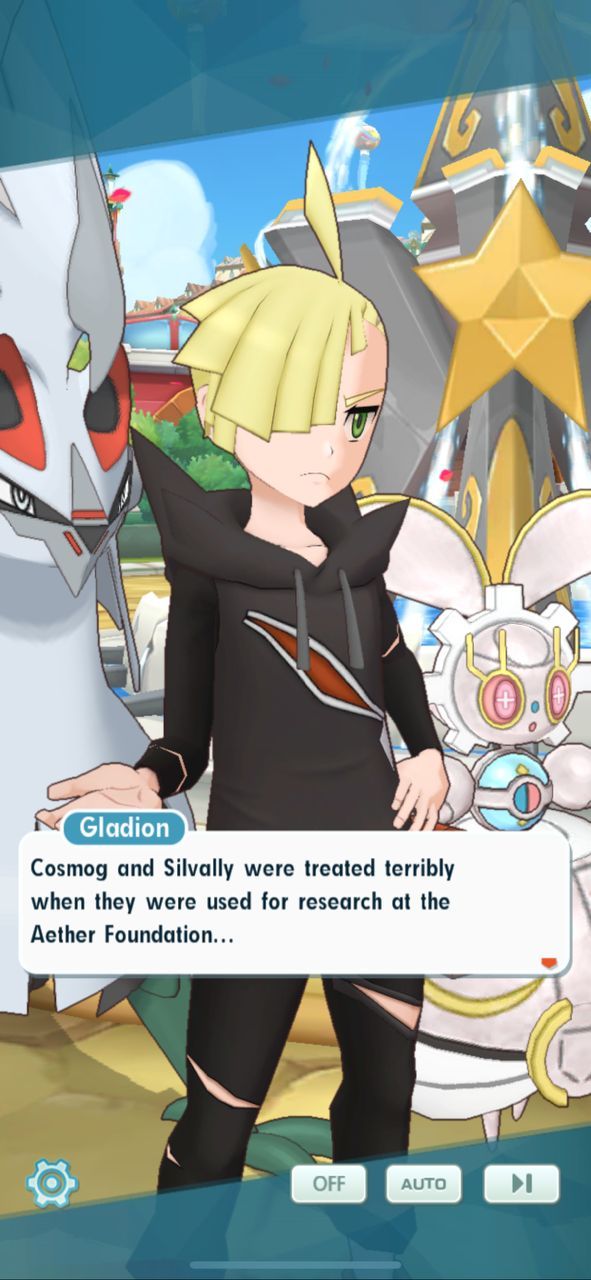
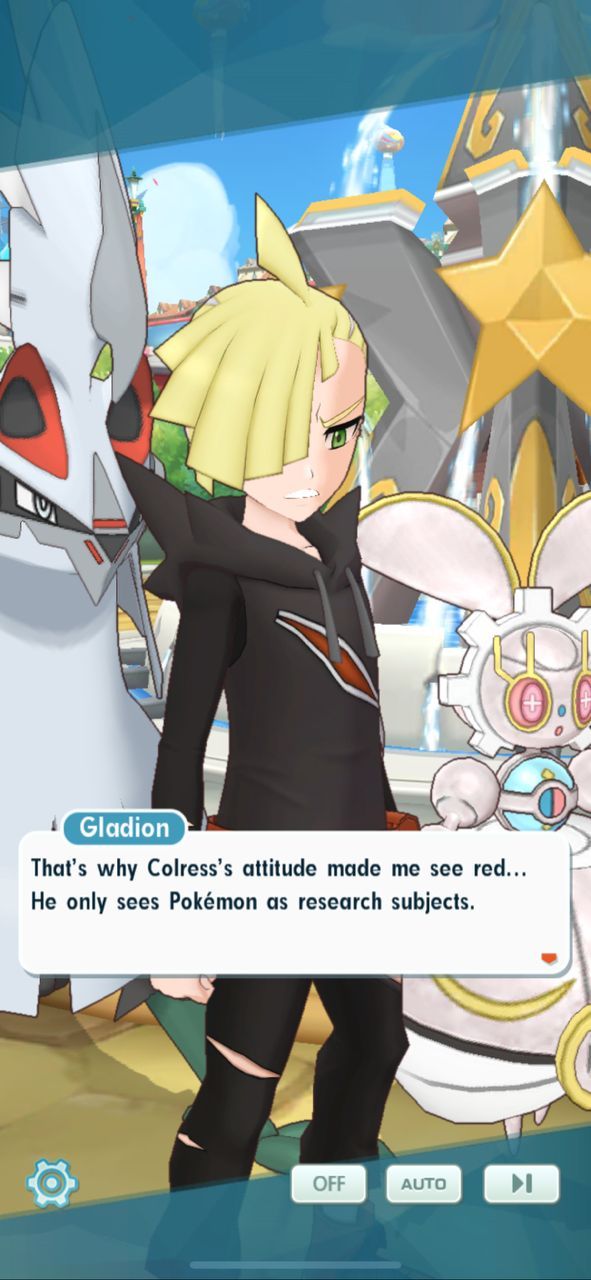

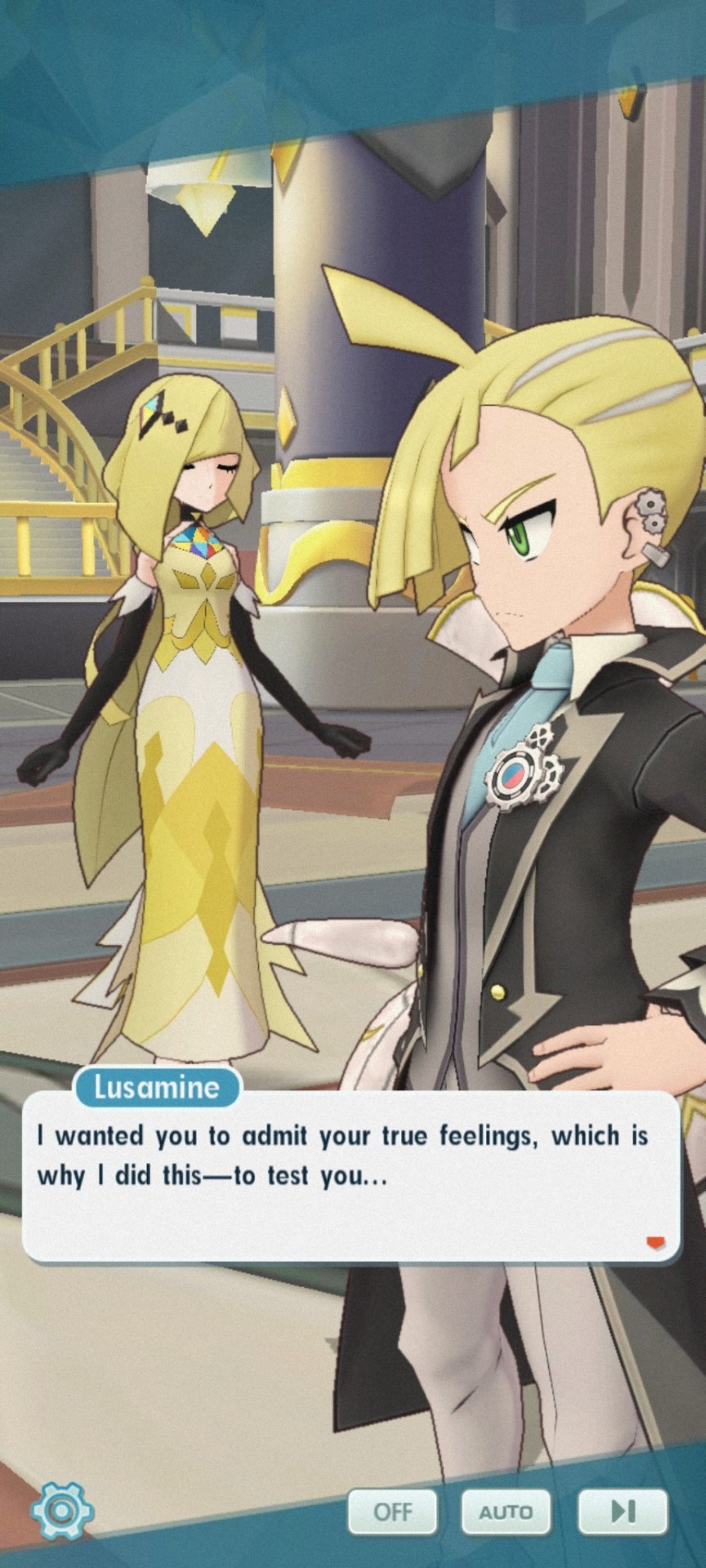
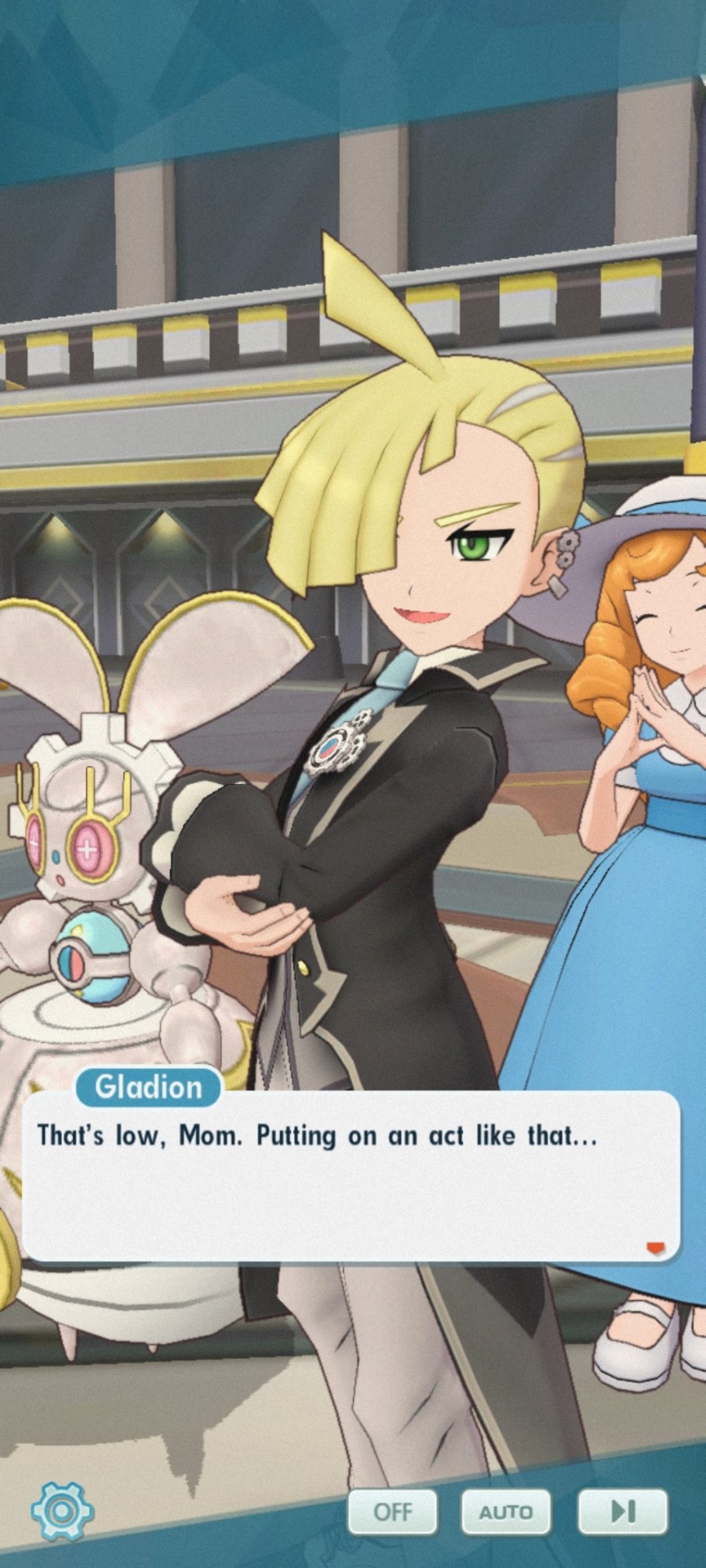
all in all i really liked this event !! i'm happy that whenever DeNA writes stories with Gladion at the forefront, they end up being more fleshed out instead of the typical "shallow friendship" stories they usually make, i suppose this says a lot about gladion's character as a whole 👏
random dump on some scenes in the event:
i love when he said get lost to colress LOL i know it's part of his character to be blunt but i didn't expect that to be his response 💀
so did lear not host a party at all and lusamine just asked to borrow his manor as part of her plan??? either way she's clearly rich enough to make such a demand 💀💀
i know a lot of us were shocked to see gladion pair up with magearna of all mons, but it honestly makes PERFECT sense 😭 it's an artificial pokemon who loves to be researched upon and gladion fears it will end up being alone because of this, THIS EXACTLY PARALLELS SILVALLY 😭😭😭 his sense of justice and moral compass is so strong like this fits his character perfectly he just doesn't want magearna to suffer a similar fate
cool to see that his "sygna suit" was really just a fancy outfit he had to wear for the event and was not modelled specifically after magearna, but i guess we can headcanon that lusamine tailored that suit for him as part of her plan lol
also i honestly loved to see that gladion is capable of being formal when he has to LOL i know a lot of people object the idea of him becoming aether president but i personally dig the idea, regardless what people think happened between him and lusamine i feel like taking a job where he gets to care for pokemon and research them ethically (in a way he thinks is right) is a perfect fit for his character
^ to add a bit to this, i also like when he can just act like a rich kid with manners when he needs to, but the second someone acts against his morals he just goes back to being stubborn and brash 😭 all this fits my headcanon that sometimes he helps out his mom with aether foundation work by travelling to different regions to care for pokemon/assist pokemon professors, etc + my headcanon of him being able to speak more "proper" when needed IS NO LONGER JUST A HEADCANON 🎉🎉🎉
i LOVE when he has nice interactions with his family, especially his mom 😭 definitely a hot take but i'm perfectly fine with lusamine repairing her bond with her kids, the SM USUM timeline stuff is a bit messy but in my opinion i prefer when after she recovers from the neurotoxins shenanigans she earnestly works to fix her relationship with her kids, because i personally believe that even in SM she was supposed to be redeemable--not because "she deserves it", but because her being redeemed could strengthen the story's message about navigating a tragic family and fall from grace, ofc this depends on your interpretation on these events in the first place but i always felt like a happier ending was better suited for the aether family (i made another post abt this a while back lol... might rewrite it again)
also gladion calls her mom while lillie is more formal and says mother right??
to sum it up i love this story because everything abt gladion is true to character + his motivations for wanting to care for magearna are perfect + i love the little things they added to his character esp for confirming my headcanon + more interactions with his family + not like DeNA's typical "friendship" stories + IT FINALLY GIVES GLADION THE SCREENTIME IT DESERVES EVEN IF THIS EVENT FEELS A BIT SHORTER THAN OTHERS 😭😭😭🎉🎉🎉💗💗💗
14 notes
·
View notes
Text
Martin Luther King Jr: 6th house in Libra, Venus in the 11th house, and Venus in Pisces
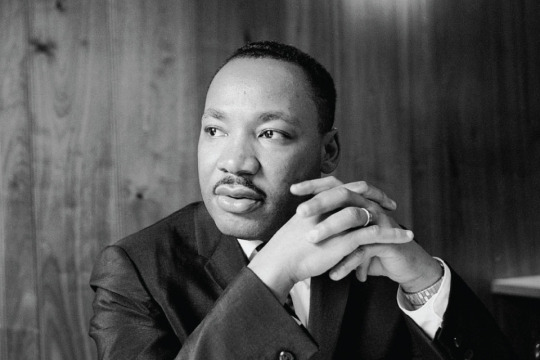
Martin Luther King Jr., the iconic civil rights leader and advocate for nonviolent protest, is a figure who has inspired generations with his impassioned speeches and unwavering dedication to justice and equality. One of his many profound and enduring statements, "The time is always right to do what is right," is not just a reflection of his ethical commitment, but it can also be viewed through the lens of his astrological chart.
King had the 6th house in Libra and the ruler, Venus, in Pisces in the 11th house. This unique configuration in his natal chart provides deeper insights into the motivation and methodology behind his relentless pursuit of justice.
The 6th house in astrology is associated with how we approach daily routines, work, and health. With Libra ruling this house in King's chart, it emphasizes his natural inclination towards balance, fairness, and harmony. Libra's presence in this house symbolizes his intrinsic need for justice, not just on a personal level but also as a universal principle and as a moral compass.
Meanwhile, Venus, the ruler of Libra, situated in Pisces in the 11th house further colors this pursuit of fairness with compassion, empathy, and a profound connection to the collective human experience. The 11th house in astrology represents social networks, friendships, and community, and with Venus in Pisces in this house, it shows King's ability to tap into the universal human condition. This positioning resonates with his dream of a world where all are treated with dignity and respect, regardless of race or background.
Martin Luther King Jr.'s planetary alignment weaves a celestial pattern that mirrors his life's work of justice, empathy, and love. The 6th house in Libra, coupled with Venus in Pisces in the 11th house, symbolizes his nonviolent approach to transcending divisions, his unshakeable moral compass, and his legacy as a civil rights luminary. This cosmic signature reveals his pursuit of justice not merely as a worldly goal but as a spiritual calling. It paints a succinct portrait of a man driven by the stars to forge a world where equality and love are the guiding lights.
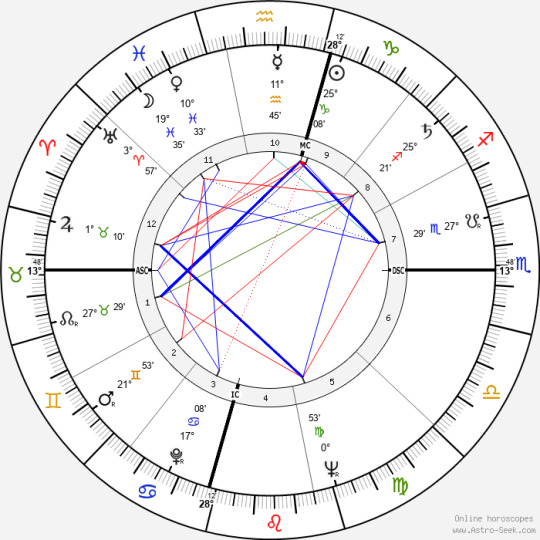
#libra in the 6th house#6th house#venus in pisces#venus in the 11th house#11th house venus#pisces venus#astrology#astrology posts#astro observations#astro notes#astrology observations#astro community#astrology notes#predictive astrology#astro content#birth chart reading#venus#astroblr#astrology community#zodiac signs#martin luther king jr
31 notes
·
View notes
Text
On the matter of Jonathan Joestar
I talked a bit about how JJBA plays around with moral ambiguity with it's protagonists here and briefly mentioned how I'd talk about Jonathan separately and that time has come! There are certain aspects of his personality that I find interesting, but don't often see discussed and I'd like to dig into them a bit. Before we begin I will say that, while I did my best to draw from the source material, this does involve a degree of headcanon so take it with a grain of salt.
Background
The problem with Jonathan is that his character is woefully underdeveloped. This was the result of multiple factors such as, A) Jonathan being the first JoJo and Araki was still developing the story and figuring out what he wanted it to be. B) JoJo pt 1 was a product of it's time and was influenced by works of the period like Fist of the North Star. This was an era of power fantasies and led to stories of big beefy dudes punching things but without much in terms of nuance or broader character development. C) Pt 1 was given a much shorter arc at only 44 chapters and therefore Araki had less time to explore his character than future JoJos. Compare this with Battle Tendency being 69 (nice) chapters and Stardust Crusaders being 152 chapters. Because of all of this we are, unfortunately, limited in what we can glean of his personality from the manga, but there are a couple of things I want to touch on.
Duty vs Concern
While we might not see the type of radical character development from Jonathan that we see in later JoJos, what we do see is a shift in perspective as he matures. This can be seen in his first encounter with Erina.
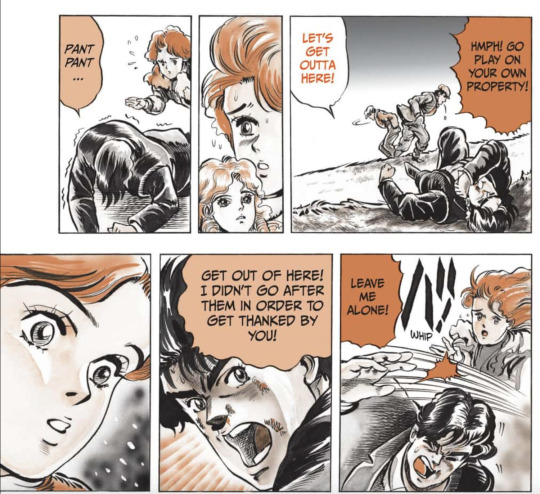
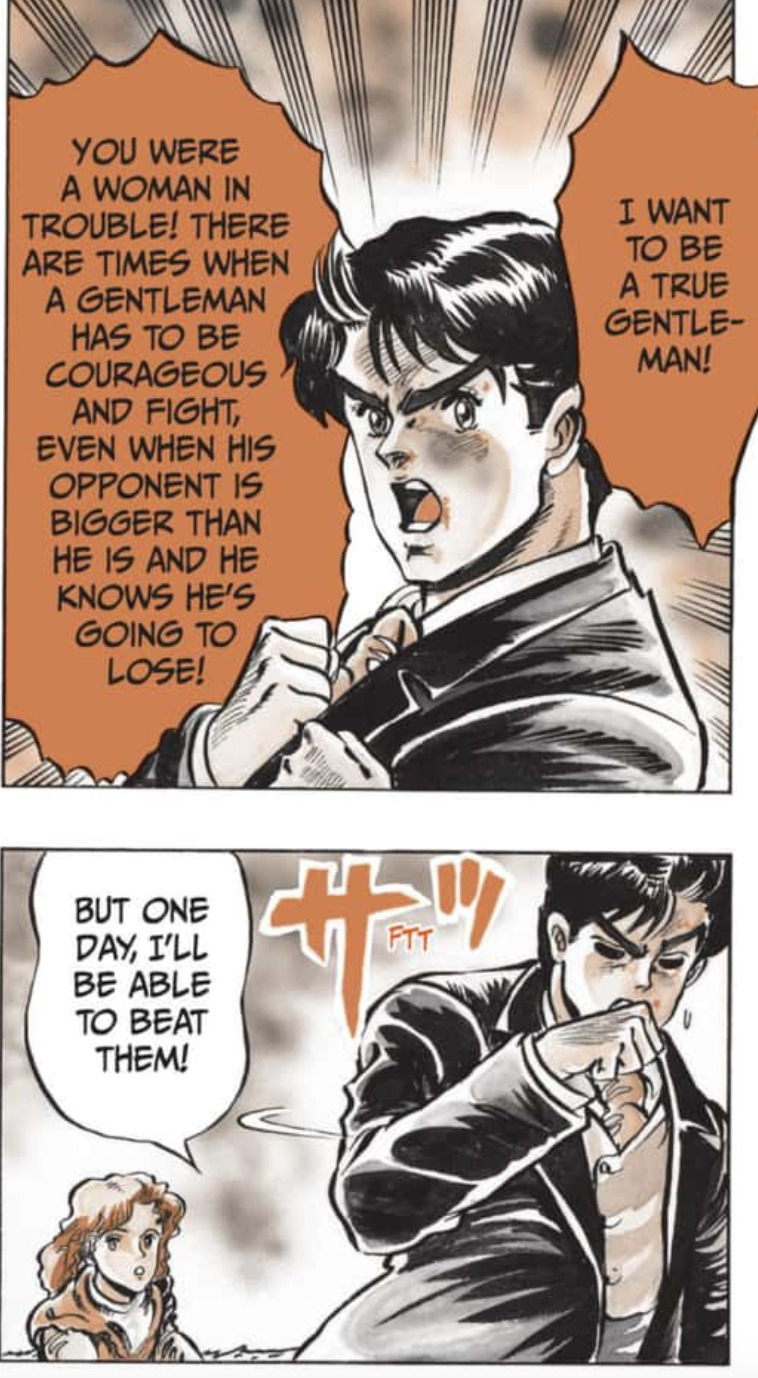
This is a boy who was motivated less out of an altruistic motive and genuine concern and more out of a sense of duty. This is something he's been taught is the Right Thing for a Gentleman to do. A woman is in danger and a man swoops in and rescues her. It wasn't so much about protecting Erina as it was about being The Hero.
It isn't until he's able to spend time with Erina that he's able to see her as a real person and not just a damsel in distress. While their time together in those early days was cut short, I think it really helped Jonathan to broaden his perspective and sense of empathy. That's not to say that Jonathan was a bad person, he was just a rich kid who spent the majority of his life being a bit coddled, but each new relationship he gained helped him mature.
We see a shift from the young boy playing the role of The Hero because the thought it was expected of him to a man who puts his life on the line because he wants to, because he'll do anything to protect and avenge the people he cares about.
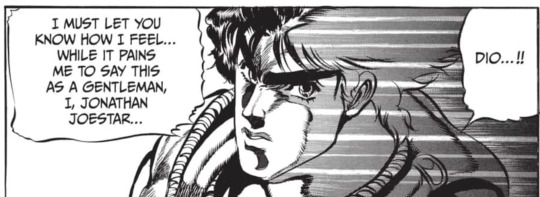


This is a man who has become hardened through the experience of loss and pain, and those experiences helped him to really truly care for others, not out of societal expectations or chivalry, but out of love.
Ironically, it's this growth that leads us to the thing you could argue is simultaneously Jonathan's biggest flaw.
Compassion to a fault
Jonathan is a character whose greatest strength is also his greatest weakness, that being his unyielding optimism. He's the type of person who is always wanting to see the best in those around him and it's this flaw that Dio took advantage of from day 1. Regardless of how much of a little shit Dio proved himself to be in their youth, Jonathan wanted to believe that wasn't beyond the point of redemption. He wanted to believe that there was a small part of Dio that had some goodness, that could experience regret and remorse even when all evidence proved to the contrary. And it was that optimism, that compassion which lead to Jonathan lowering his guard which allowed Dio to seize the opportunity and strike.

This was a quality that we also saw reflected in Jonathan's father, who also had a history of overlooking the glaring red flags in Dario, not because he was oblivious, but because he wanted to believe he'd become a better person. A quality which led to George taking in Dio even though he was under no obligation to do so, and (we can only assume), choosing to overlook any red flags the boy may have shown in his youth.
George's death was the shock Jonathan needed to realize the truth, that Dio was irredeemable and that he'd chosen to strip himself of his humanity long before donning the stone mask.

AND YET
In spite of the loss of his father and countless others during his quest to defeat Dio, there's still a small part of Jonathan that holds a bit of fondness for him, even at the end of all things. Jonathan's strength is that unlike Dio, he chooses to retain his goodness and humanity.

It was the goodness of Jonathan's heart that allowed him to perhaps be the only one who's ever truly known Dio, the only one who's seen beyond his bravado and facade. And it was this goodness that led to their fates being connected forever.
#jjba#jonathan joestar#jojo's bizarre adventure#character analysis#jojo no kimyou na bouken#b talks jojo#I am once again here to ramble about the silly beefy pretty man anime#I don't even know if this is coherent but I tried#it really is a shame that we didn't get to know Jonathan better#anyway as always open to hearing thoughts and opinions from others so if I done fucked up royally let me know lmao#honestly I probably could have written more about this but even I have my limits
73 notes
·
View notes
Text
Let my man be human, so he can be a grey character!
"Daemon Targaryen is a grey character, because x violent act or his x action on the way to power", are probably the sentences I am most sick of in regards to him. Because if those are the only justifications, then they are poorly based. Daemon is from a violent society. By only basing his greyness on his time as commander, the Steps, or making his every act self-serving, one overlooks where he comes from and who he is.
Westeros has always been a violent society. It wasn't until Alysanne that "the first night" was outlawed. Tourneys are big events in their society, even though it is purely based on violence. Correct me if I am terribly wrong, but we only hear of Daemon delighting in violence when he is enforcing westerosi laws. Laws that are violent, that demand you answer violence with more of it. I would also like to remark that his delight may come from his peculiar moral compass. Also that he likes to remind KL's people to follow the laws his house has asked them to follow. Or that he just doesn't like rape that much., shocking.
It is important to note F&B is about the Targaryens so talking about a random lordling loving violence would be odd. Daemon is a royal, so regardless rumors and speculations will follow him.
Anyway, Daemon is mostly likely one of many who delights to bestow violence upon those who have been deemed deserving of it. If Daemon loved to go about beating people or more just for the fun of it, it would be mentioned. Yet it isn't.
His hunger for position and power is not hard to understand why. He is a second son without land or a household, he has a shitty marriage (until Rhaenyra) and is given little power by Viserys. In short, he wants more. He is a prince, yet a minor lord has more holdings than him. A minor lord has land, a household, a family, and more. Daemon up until Rhaenyra and somewhat Laena, has no land, no household, and no family he has been part of creating. He has a title, a dragon, and a wife (Rhea Royce) he loathes. It is understandable he wants more in terms of standing.
In my opinion, what makes Daemon a grey character is his moral compass. His willingness to take action, even though they don't play by the rules. He never shies away from who he is, and he embraces and utilizes his "darker" aspects to further his family and his house. Because if his actions and reasons all become self-serving his motivations no longer have complexity. They are only to serve Daemon Targaryen.
However, if his motivations, actions, and more come from a place of complexity and contradictions, he becomes a grey character. He thinks beyond himself and has feelings beyond his "Rogue Prince" persona (I am sorry, but the whole Rogue Prince thing seems more like a persona, that has been blown up by others around him than his whole person. No one can change that opinion.). He becomes human, not just a fuckboy ideal.
So for the love of sliced bread, let Daemon be human. Let him be part of the many. Let him have contradicting and complex feelings, let him have love! He will still remain "six or sixty men, he is still Daemon Targaryen" even if he is part of the norm.
(if I had to take a guess, it is his unpredictability and his cleverness they fear. Not the violence or his hunger for power.)
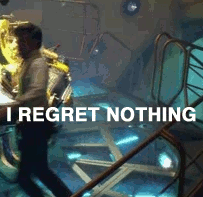
#daemon targaryen#Let my man be human#f&b#I will take criticism on a Monday shitty day so lets make it worse#daemon blood fans terrify me#i should sleep now#it's not that deep
19 notes
·
View notes
Text
Daemon Targaryen Is Not a Good Person
But he's a Great character.
I think this fandom (as so many fandoms nowadays) are getting their wires crossed with "Complicated, Compelling Character" and "Morally Understandable Character."
Daemon is not a good person. He is actually pretty horrible and if you've read Fire and Blood, you know this. You know what is coming and the things he does.
He is a fucking compelling character. A great character. Complicated and you want to follow him. You want to see what he gets up to. Who he cares about. How he treats them, who he loves and who he hates.
Do I think he's a monster? If we're defining a monster as Joffrey Baratheon, then no. I don't think he's actually a monster (yet?) and I'll agree with the show directors on that. If the standard is Joffrey, there are not actually that many characters that are true monsters.
But Daemon is not a good person. I'd say he's not super far from monsterdrom, here, okay.
He enjoys power. He wants the throne. That's the motivation for his entire character (shocker in Game of Thrones) and he's written super well. The show doesn't shy away from who he is and what he wants. They're just saying "He doesn't necessarily enjoy the pain of his direct family members" and, even "I don't like seeing my family members sad and that makes me sad" which like...
That's not a high bar. The bar is in hell, actually.
He loves his family.
He loves his brother.
He loves his niece.
He also wants to be on his brother's throne. He also wants to use his niece to get on that throne. He also terrorized a city in the name of "crime reduction" which was really a flex on power and to be able to make a city fear him. He also bought out a pleasure house to celebrate the death of his nephew meaning he was the primary heir again.
~~SPOILER WARNING FOR FIRE AND BLOOD~~
WARNING
He also hires two guys to kill one of Aegon, son of VIserys, children. One of whom threatens to fucking rape the little girl if the mother does not choose which one of them fucking dies. Then kills the one she did not fucking choose. You cannot morally justify that. You can't. Regardless of WHY he did it and for what retaliation. Even if he did not order those things specifically, he knew who he was hiring.
Time will tell if they include this in the show, but I wouldn't hold my breathe of them not doing so.
END SPOILERS
He's kind of like Show!Stannis Baratheon. You can still like him, but you can't really forget he's burning people alive in the name of conquest. Same with Dany.
The show is bad people doing bad things to other bad people.
Daemon is one of the more interesting bad people. That's all.
And I love his character, mind you. I can understand some of his logic, maybe. Wouldn't say a lot of it is Excusable in a moral sense.
Fandom needs to rectify this weird shame about liking characters who are actually pieces of shit. Fiction is where you get to enjoy following and exploring these pieces of shit because, in real life, you would despise them and everything they are.
Doesn't mean you're laughing and in glee in all the ways and scenes in which they're being shitty, but you absolutely can find someone who is committing horrible acts of humanity compelling as all hell because they as a fictional character are interesting. You can find them thought-provoking. You can find them chilling.
Viserys is also not a good man.
(Slight Spoilers but you guys can guess this, honestly)
Rhanyera will not be a good person.
Barely one main character in this show is going to be on the morally upstanding side of the compass. So, if you need that in your media consumption, this might not be the show for you.
(End)
TLDR:
Daemon has always been a pretty fucking terrible person who is written in a very human way and that makes him a great character. He has/will have character development, but that doesn't change that he's a p shitty person. The books and the show are not shying away from this. You don't have to excuse it. Still fun to watch.
Those things can and should co-exist.
177 notes
·
View notes
Text
ROUND 1 / SIDE A / POLL 9
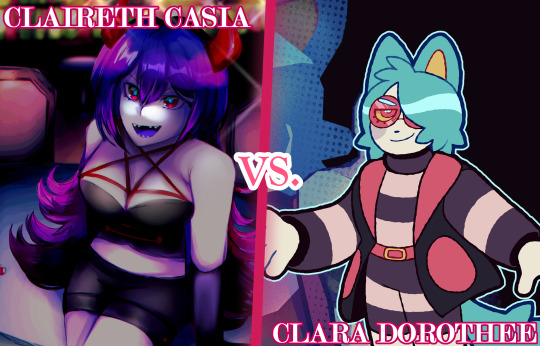
Claireth Casia (@kalopseance) vs. Clara Dorothee (@solobodor)
Claireth Casia info:
Description:
A tall succubus known as The Gambling Queen. Extremely good at gambling, as that title suggests. She's addicted to…ahem.. 'magic potions' that are illegal in the kingdom she lives within, but she has somehow managed to seduce her supplier to give her them for free.
On the surface she is loud and playful, but she makes no attempt to hide what is beneath the surface- hating the idea of "justice" and proclaiming it to be a self-righteous excuse to feel good about your own selfishness, Claireth believes the most merciful thing in the world is to be honest about your cruelty.
Claireth does not think anyone at all is truly capable of caring about someone else more than they care about themself. She is convinced that any kind action you take for the sake of someone else- is always actually done out of self interest, always actually to benefit yourself in some way instead of out of compassion for another person.
A belief that you only "care" about others because they benefit you.
A belief that even the most selfless people, when push comes to shove, wouldn't hesitate to abandon the people they claim to "care" for the most- in order to help themselves.
However, she does not regard selfishness as a flaw.
Though she believes everyone is naturally selfish and unempathetic, she does not percieve these as traits that make someone a bad person. She believes that- the only thing that makes someone a bad person- is any attempt at self-justification.
As she believes that being selfish and acting for your own sake alone is natural and universal, she thinks of that in itself as its own justification, and she believes it is the only justification anyone needs. That it's simply normal to be selfish, and one way or another, everyone will hurt someone for their own selfish desires.
And she believes that that anyone who tries to argue some justification for their actions will always be worse than someone who doesn't.
Even so, she also despises those who feel immense guilt and regret for their actions, believing that wallowing in self-pity is worthless and only shows how weak people can be, and she often assumes that such self-hatred and guilt is ultimately just excessive self-pity with the ulterior motive of making others sympathize and forgive them, regardless if said person feeling guilt is even consicous of that fact.
She does not believe that people are "good or evil" inherently- she views everyone as morally grey overall, but she seems to hold a particular grudge against those who use lies to gain the trust of others.
Because Claireth thinks that honesty is merciful- that being honest about your selfish motivations without trying to gain trust is, at it's core, the most merciful thing you can do- because by gaining someone's trust and making them think you are a good person, betraying them will hurt them worse than anything you could do to them if they never trusted you at all.
As a result, she's very open and honest about her self-motivated interests when cooperating with others. Interestingly, though, this makes her a rather loyal ally; as long as you remain useful to her, she will not go against you or lie to you. She is violent and unapologetic of that fact, but she is not particularly sadistic nor is violence ever her ultimate goal.
Crimes:
beats people with a spiked bat
steals and cheats
horrible to everyone around her, scary
weird morals system
Other notes from the submitter: shes hot
Clara Dorothee info:
Description:
A Girlfailure disguised as a Girlboss.. or Both?
She's a Cat girl (but like an actual cat) who absolutely loves being able to control every aspect of her life and will do anything in her power to keep it that way.
She scams, gaslights and manipulates the employees of her very own company into doing the dirty work for her and attempts to kill anybody that would try to stop her.
Crimes:
repeatedly tried to murder her sibling
scams
hired two people, turned them against one another, manipulated one and isolated then tried to kill the other (failed)
graverobbing & unethical experimentation
Other notes from the submitter: Original Creator is Bugwizard (on Toyhouse) If that helps, she has a TH page with much more info https://toyhou.se/5829401.clara-dorothee
43 notes
·
View notes
Text
True honor is rooted in a steadfast commitment to our core values and principles, even in the face of challenges or temptation. It's about consistently acting in alignment with what we believe is right and just, regardless of the circumstances. This includes being honest, showing integrity, and treating others with respect and compassion.
Staying true to our values and principles isn't always easy, especially when we are confronted with conflicting interests or pressures from others. It requires inner strength, courage, and a willingness to make difficult choices. It also means accepting responsibility for our actions and the impact they have on those around us.
When we live by our values and principles, we earn the respect and trust of others. Our words and actions become consistent, and people know they can rely on us to act with integrity and fairness. This reputation is a reflection of our true honor, and it can have a profound impact on our relationships and the communities in which we live and work.
Moreover, staying true to our values and principles aligns us with our authentic selves. It enables us to live with a clear conscience and a sense of purpose, knowing that our actions are in harmony with what we believe to be right. This inner peace and self-respect are invaluable, contributing to our overall well-being and personal fulfillment.
In essence, true honor is not just about how we present ourselves to others; it's about the authentic alignment of our thoughts, words, and deeds with the values and principles that guide us. It is a reflection of our character and integrity, and it serves as a compass in navigating the complexities of life.
Ultimately, true honor transcends personal gain or recognition. It's about upholding what we believe to be just and righteous, even when there are no external rewards. This kind of honor is timeless and universal, and it is deeply admired by others.
In a world that is often filled with competing priorities and moral ambiguity, true honor is a beacon of light. It inspires trust, brings people together, and fosters a sense of unity based on shared values. When individuals and communities honor their principles, they contribute to a more just and ethical society.
Moreover, true honor has the power to inspire and motivate others. When people witness individuals acting with integrity and courage, it encourages them to do the same. This ripple effect can create a positive and transformative impact, leading to a culture of honor and decency.
Staying true to our values and principles also helps us navigate difficult decisions and ethical dilemmas. When we have a strong moral compass, we are better equipped to make choices that align with what we believe to be right, even when the path is unclear or challenging.
In addition, the pursuit of true honor can be a lifelong journey of self-discovery and growth. It requires reflection, introspection, and a willingness to continually assess and refine our values and principles. It's a process of ongoing learning and development, as we strive to live more fully in accordance with our deepest convictions.
In the face of adversity, true honor can be a source of strength and resilience. It provides a solid foundation upon which to stand firm, even when the winds of opposition blow strong. When we hold fast to our values and principles, we demonstrate an unwavering commitment to what we believe is right, and that has the potential to galvanize others and effect positive change.
This is especially important in leadership. Leaders who embody true honor inspire confidence and trust among their followers. They set a powerful example for others to emulate, and they are able to make principled decisions that benefit the greater good.
Ultimately, true honor is a timeless and universal concept that transcends cultures, religions, and ideologies. It is a foundational element of human dignity and morality, and it serves as a guiding light for individuals and societies seeking to live with integrity and wisdom.
In conclusion, true honor comes from staying true to our values and principles. It is about embodying integrity, acting with courage, and upholding what we believe to be right and just. True honor inspires trust, fosters resilience, and has the power to transform individuals and communities for the better. It is a timeless and universal concept that serves as a beacon of light in a world that often faces moral challenges and uncertainties.
7 notes
·
View notes